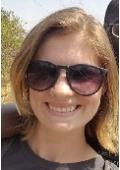Lucy is in her early 20s and has had M.E. since she was a child.
I believe I was around five years old when I first started showing signs of ill health. At the moment I can work full time and manage to maintain a relatively good energy level, but my M.E. was at its worst when I was around 11 years old. I couldn't leave the house for a long time and I also lost my sight for around six months. I struggled with headaches and migraines, as well as joint and muscle pain. I also had difficulties with my concentration and memory and struggled with mental health issues due to the isolation caused by my M.E.
I lost a lot of friends and my social life due to not being able to leave the house or having the energy for visitors. This feeling of isolation and hopelessness for my future led to me developing Obsessive Compulsive Disorder, anxiety and depression, issues which I have dealt with for many years since. My relationship with my mother and brother also became strained due to my mental health and the help that I needed with simple things, especially after losing my sight.
Because of my M.E. I had to leave education. I did eventually start medical tuition at home for an hour most days, and my first real experience of full time education was when I attended college to study animals (which I managed to pass with high grades). I was too young to work when I was at my worst but I have had various jobs throughout the past six years and have recently returned from three months volunteering with young adults and children in Senegal with International Citizens Service and their partner organisation, YCare International. A large majority of children and young adults in Senegal don't have access to education for a variety of reasons, which limits their ability to secure employment. We taught a number of free classes for all ages, at the local YMCA and in more remote villages to make it accessible for all. The classes involved subjects such as language, maths, writing, computer skills and entrepreneurship, and projects in the community such as farming and implementing irrigation systems.
The people I met and worked with in Senegal were all very welcoming and supportive to the English volunteers, and extremely understanding when it came to the language barrier and cultural differences. The Senegalese volunteers and the staff at the YMCA were a lifeline for us; we all worked so closely together that we created strong friendships and learned so much about each other's cultures and daily life. It is an experience I would recommend to anyone.
Don’t feel bad if you’re struggling
When I was diagnosed I had to give up my hobbies such as kickboxing and horse riding due to the symptoms and fatigue I was feeling. Last year, however, I started horse riding again as I now have the energy, and it is still something I enjoy doing.
When I was younger I was advised to keep a time/symptom management sheet and although I understood the benefits to this, I didn't get on well with it. As I got older I tried sleeping tablets, herbal supplements and exercise regimes. None of these methods seemed to make any improvements to my health, which resulted in me struggling further with my mental health. I eventually found that treating my mental health started to improve the effectiveness of the symptom management techniques I was using.
Overall I found the medical professionals I dealt with to be very good. Once the diagnosis was made I started to see a specialist for regular check-ups, who was extremely helpful when having to explain to my school why I could not attend anymore.
If someone told me they had just been diagnosed with M.E., I would want to tell them that they might struggle at times and it might seem unfair, and they might miss out on doing certain things with friends and family but they shouldn’t push themselves to do everything everyone else is doing. If you’re struggling then don't feel bad about it, just rest. Do what you need to do to feel better.



